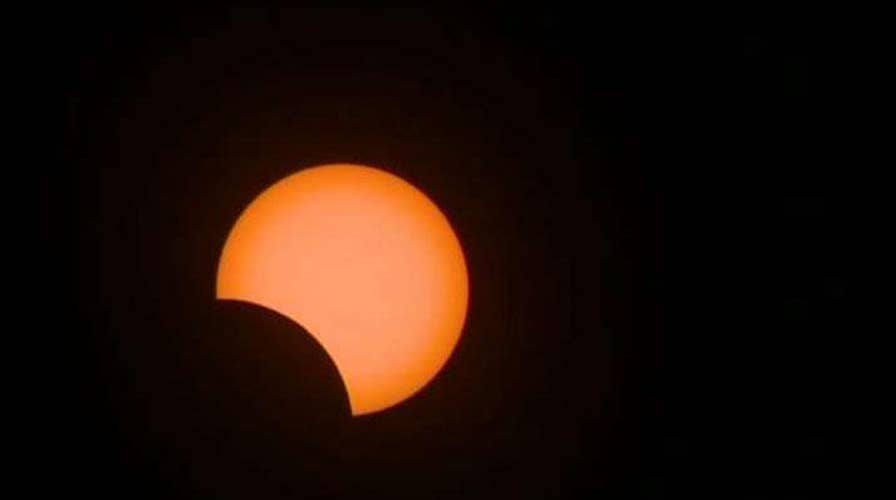Sky watchers treated to solar eclipse over South America
Insight from Space.com senior writer Mike Wall as path of totality crosses over Argentina and Chile.
The first total solar eclipse since 2017 darkened the heavens over Chile and Argentina on Tuesday as tens of thousands of tourists and locals gaped skyward.
Tourists from around the world gathered to witness the phenomenon.
The eclipse made its first appearance over Chile at 3:22 p.m. above La Serena, a city of some 200,000 people where the arrival of more than 300,000 visitors forced the local water company to increase output and service gas stations to store extra fuel. Police and health services were also reinforced.
WHAT CAUSES A TOTAL SOLAR ECLIPSE?

A solar eclipse observed at Coquimbo, Chile, on Tuesday. (REUTERS/Rodrigo Garrido)
The total eclipse began there at 4:38 p.m., and lasted about two and a half minutes.
Thousands jumped, shouted and screamed as the eclipse arrived.
A solar eclipse occurs when the moon passes between the Earth and the sun and scores a bulls-eye by completely blocking out the sunlight.
“Seeing the total eclipse from the great Atacama Desert was a breathtaking experience," Patrick McCarthy, vice president of the Giant Magellan Telescope, told Fox News, via email. "The harmony of the Earth and the sky was revealed in all of its glory as the Moon passed in front of the Sun casting an indescribable light on the landscape that can only be seen during a total eclipse. There’s truly nothing like it.”
The Earth’s next total solar eclipse is expected to be on Dec. 14, 2020, crossing Chile and Argentina though on a different path.
Northern Chile is known for clear skies, and some of the largest, most powerful telescopes on Earth are being built in the area, turning the South American country into a global astronomy hub.

A solar eclipse observed at Coquimbo, Chile, on Tuesday. (REUTERS/Rodrigo Garrido)
The town of La Higuera was plunged into darkness.
“We hope this milestone will transform [the town] into a tourist attraction so that visitors ... can come to La Higuera and take a picture where there once was a total sun eclipse,” Mayor Yerko Galleguillos said.
CLICK HERE TO GET THE FOX NEWS APP

A partial solar eclipse observed at Coquimbo, Chile, on Tuesday. (REUTERS/Rodrigo Garrido)
Town officials distributed more than 2,000 cardboard-frame protective eyeglasses at local schools and community centers.
Thousands of visitors also trekked to neighboring areas of Argentina where the eclipse also was total.
Fox News' James Rogers and The Associated Press contributed to this report.









































